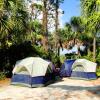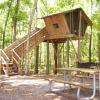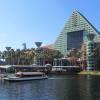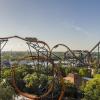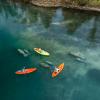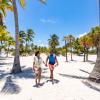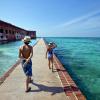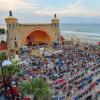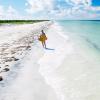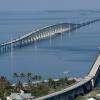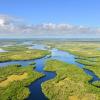By Kevin Mims
Drift dives along miles of spring-fed river. Shipwreck trails in the Atlantic and Gulf of America. Delicate, vibrant coral reefs. Gin-clear freshwater springs and underwater caves.
When it comes to scuba diving, Florida has it all.
Here are 10 of the best places in the Sunshine State for scuba diving.
Maritime Heritage Trail, Biscayne National Park
The many shipwrecks along the Maritime Heritage Trail of Biscayne National Park, south of Miami and north of Key Largo, make it an idea place to see explore nautical history of South Florida. The oldest of the wrecks date from the 1800s to the 1960s. Tropic Scuba offers scuba and snorkeling charters to the Maritime Heritage Trail and other locations within Biscayne National Park.
SS Copenhagen, Lauderdale-By-The-Sea
The steamship SS Copenhagen ran aground on a rocky ledge in the Atlantic Ocean and sank at the turn of the century. Now the 325-foot vessel’s wreckage is part of the coral reef, which scuba divers can explore three-quarters of a mile offshore, 3.6 miles south of Hillsborough Inlet. The vibrant reef is relatively shallow at 15 to 30 feet deep and is home to a variety of marine species including sponges, tropical fish, eels, and hard and soft coral. Gear rentals are available through South Florida Diving Headquarters.
Florida Panhandle Shipwreck Trail
Besides having brilliant, blue-green water and miles of pristine beaches, the Emerald Coast is a treasure trove for wreck diving in the Gulf of America. Twelve shipwreck sites offshore between Pensacola Beach and Port St. Joe in Northwest Florida make up the Florida Panhandle Shipwreck Trail. Five of the wrecks are near Pensacola Beach, one is off the shore of Destin, five off Panama City Beach, and one is near Port St. Joe. Dive shops along the coast can provide rentals and boat charters to wreck sites.
Devil’s Den, Williston
From above, there isn’t much to see of Devil’s Den in Williston—until you step down the steep staircase that leads to the glowing blue spring within the surrounding prehistoric cave. The privately-owned spring is 120 feet in diameter at the surface with a maximum depth of 54 feet. There are campsites and cabins available on the premises for divers and snorkelers who want to stay for more than the day. Rental equipment is available on site. Be sure to arrive with a dive buddy—it’s required.
Ginnie Springs, High Springs
Ginnie Springs is synonymous with freshwater scuba diving and cave diving in Florida. The property has seven springs, a full dive shop with rentals, hot showers, a large campground full of tent camping sites, and one rental cottage. Depending on skill and certification level, divers can explore the Santa Fe River, Ginnie Cavern, and the Devil’s spring system, made up of three springs (Little Devil, Devil’s Ear, and Devil’s Eye), which is open to swimmers and scuba divers alike. Not certified to dive? Ginnie Springs has instructors who can provide training and certification.
John Pennekamp Coral Reef State Park, Key Largo
For many, the thought of diving Key Largo likely conjures images of the famed Christ of the Abyss statue submerged in the clear waters offshore, but there’s much more to see in the coral reefs of John Pennekamp Coral Reef State Park, the nation’s first underwater park and one that spans 70 nautical square miles in the Florida Keys. To see the best spots on the coral reef, book a scuba tour directly at the park.
Neptune Memorial Reef, Key Biscayne
For anyone who has ever dreamed of seeing the Lost City of Atlantis, Neptune Memorial Reef should be at the top of the diving wishlist. An artist’s interpretation of the lost city, this artificial reef 3.25 miles east of Key Biscayne is both a massive work of art and an active cremation memorial site. It sits at a depth of 40 feet and features statues and structures—from the lions that guard its gates to intricate pillars and columns—that create an otherworldly atmosphere and unique scuba diving experience. Divers can get there with their own or rented boats (there are buoys at the site) or book a tour with one of the reef’s dive partners.
Phil Foster Park, Riviera Beach
Phil Foster Park in Southeast Florida offers easy access shore dives, where an artificial reef stretches on for 800 feet and marine life abounds. Parrotfish, angelfish, sergeant majors, rays, starfish, octopus, and more can be seen in water averaging six to 10 feet deep, with maximum depths of 20 feet. Guided tours and equipment rentals are available through Blue Heron Bridge Scuba and Pura Vida Divers.
Rainbow River, Dunnellon
A drift dive with the current along the clear, spring-fed Rainbow River in Dunnellon is among the best freshwater scuba diving experiences in Florida. With visibility up to 200 feet, it’s easy to observe the flora and fauna of the river system, from gar and turtles to otters and anhingas catching their dinner. Guided drift dives are available though Mac’s Sports Inc.
Wreck Trek, Fort Lauderdale
It’s possible to see several wrecks in one drift dive along the Wreck Trek in Fort Lauderdale, which is made up of the Jay Scutti, Merci Jesus, and Tracey wreck sites. The vessels, which vary in size, were sunk in the 1980s and 1990s to depths between 50 and 72 feet. If the conditions are right, a diver can cover all three sites in a single dive, which can be arranged through South Florida Diving Headquarters.


